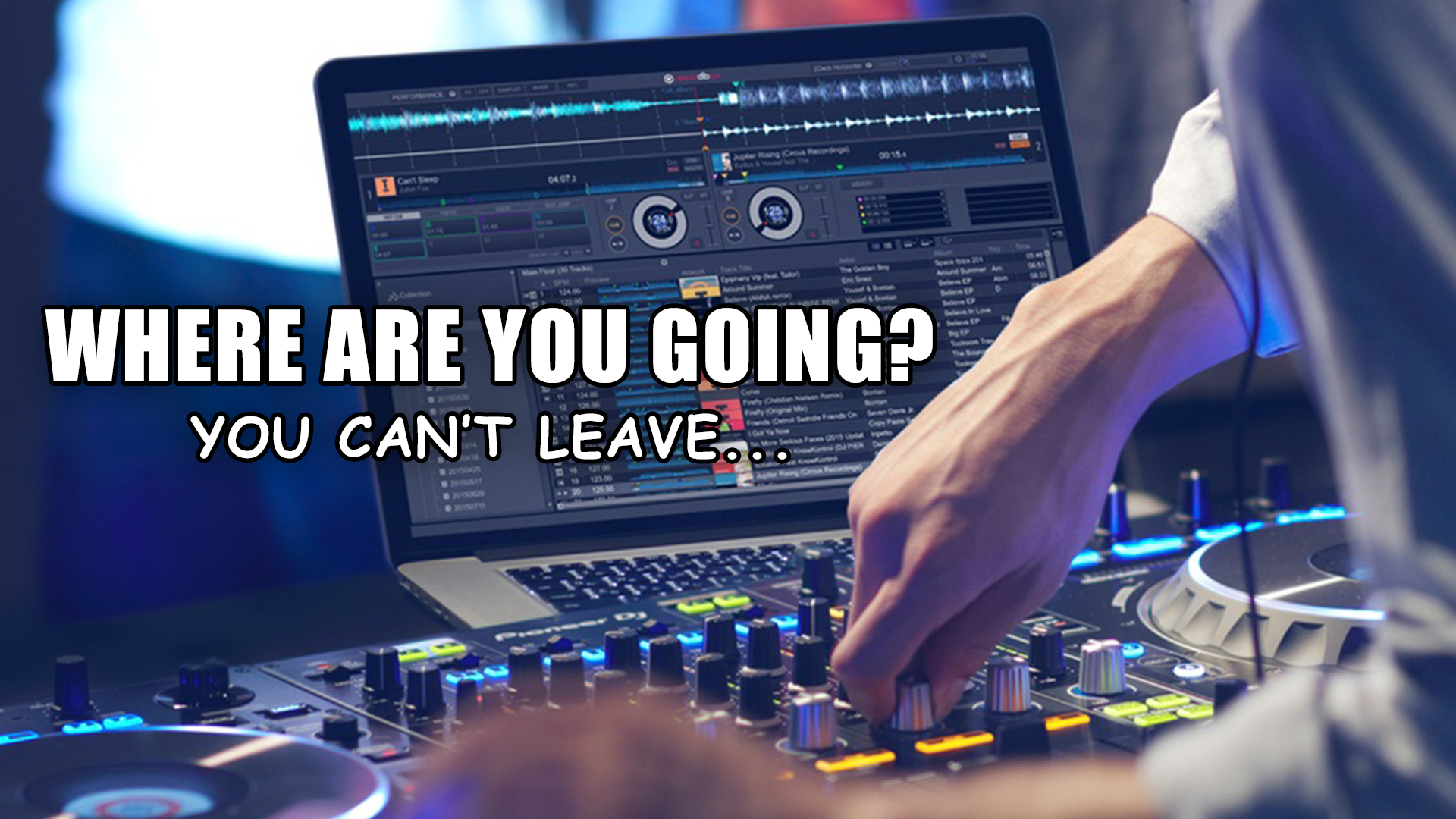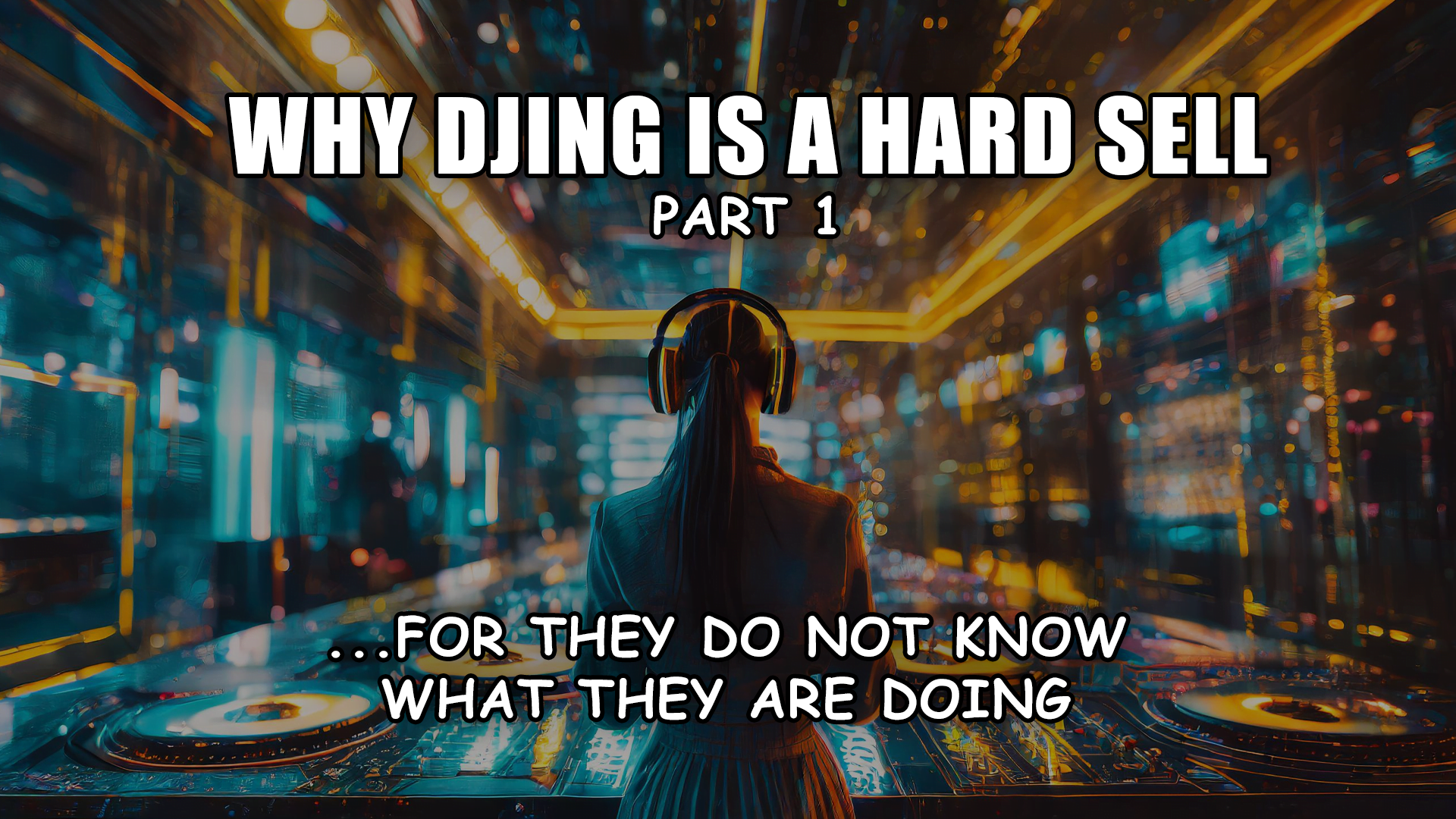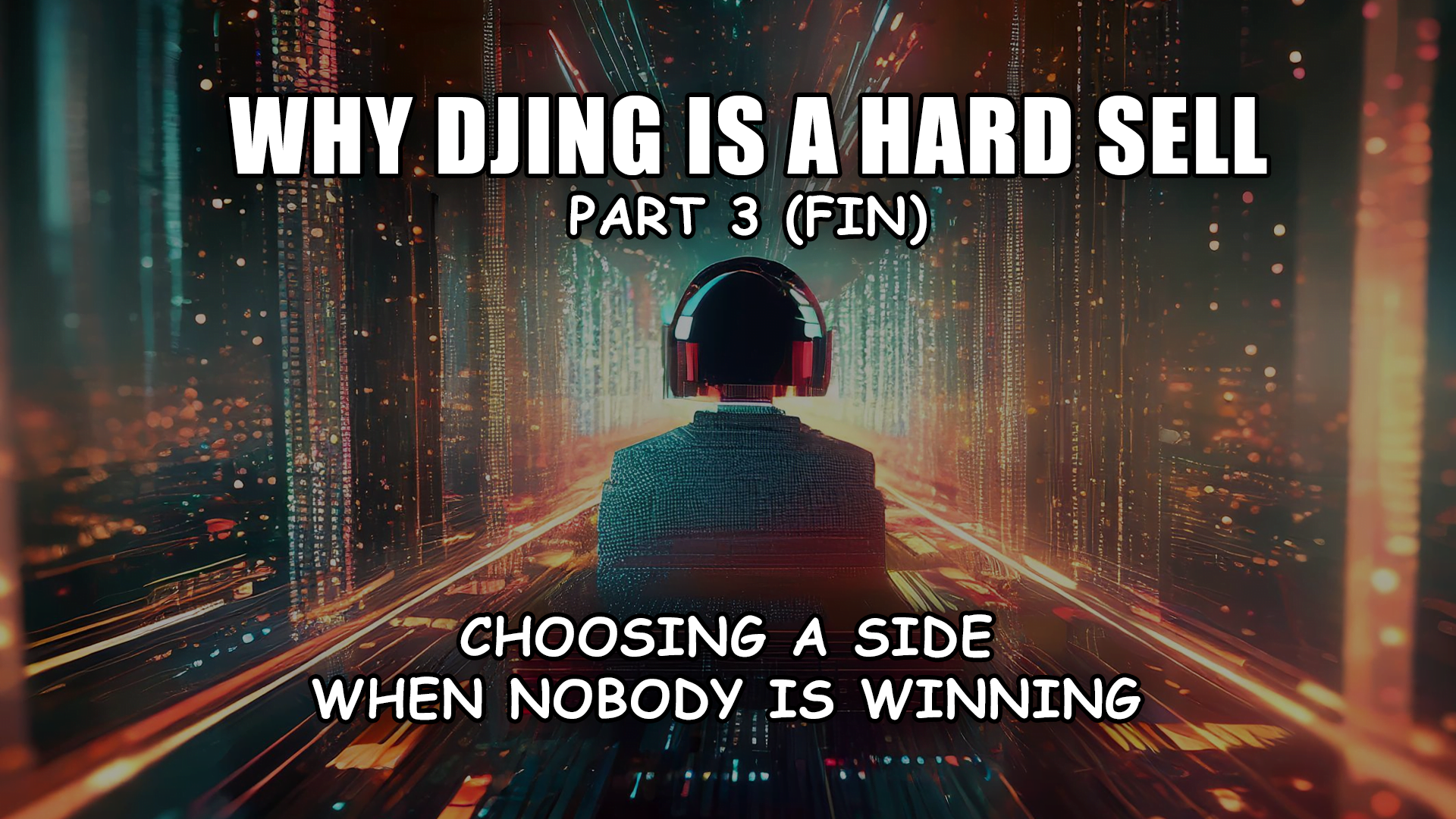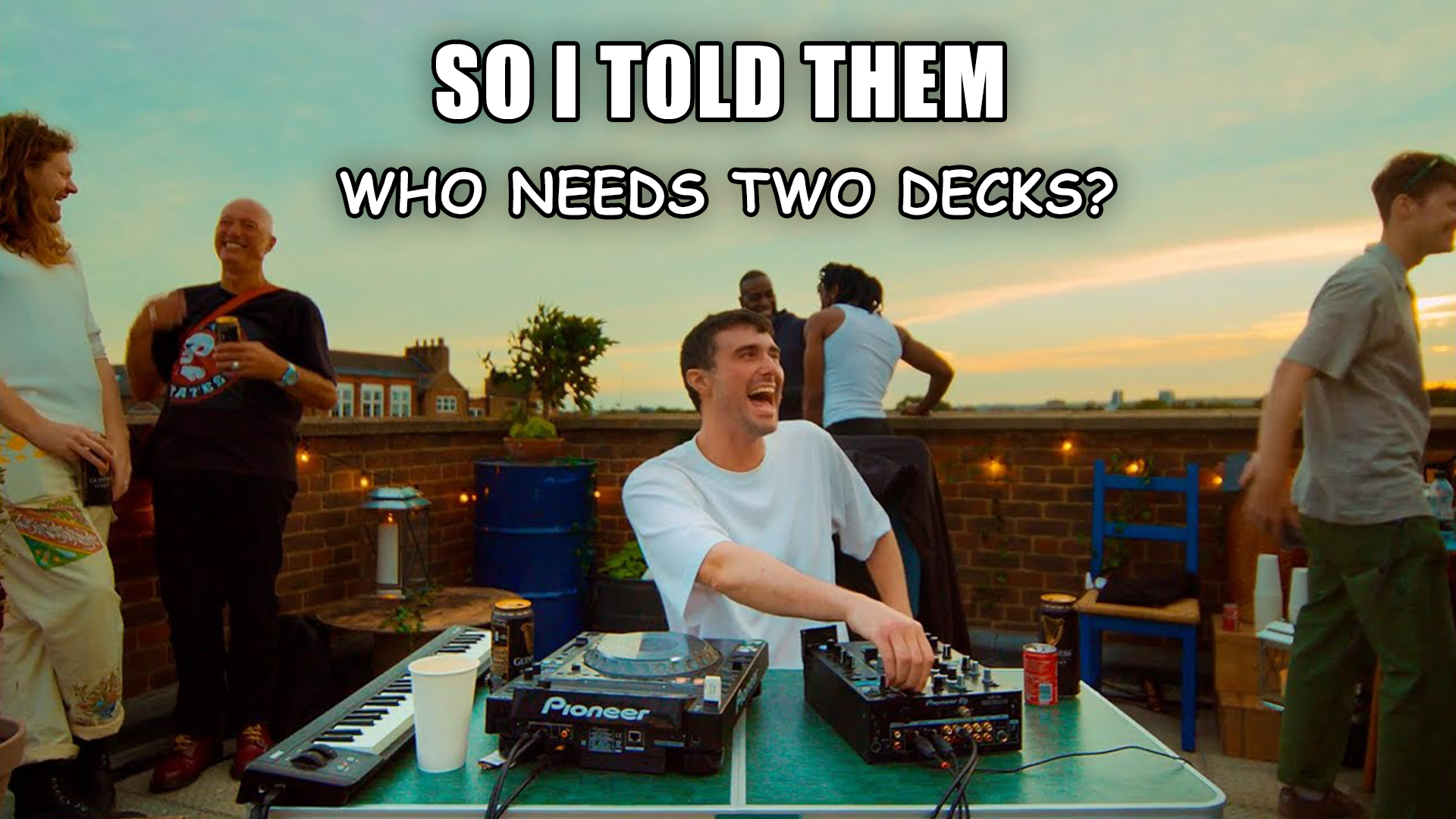During our never-ending shit-chatting and introspection on the Rogue DJs Slack instance, we realised three out of the four on the team continue to be hardened Traktor users. The other one has stuck by Serato. It got us thinking… what pushes people over the edge to completely change DJ ecosystem? And with a potential new DJ software ecosystem on the horizon (if the recent leaked screenshot is any indication), we might have more choice of where to go.
For the Traktorites, it’s been a very long, and some might say mostly loyal, journey. We’ve all three been there from pretty much the beginning. I myself remember first trying Traktor DJ Studio 2 back around 2003-ish, having taken a couple of years away from the discipline after getting frustrated with my cheap belt drive turntables. The curiosity came off the back of seeing my friend gig out with Final Scratch (and a Linux partition) on a Sony Vaio laptop, then trying out MixMeister to knock up a few mixes with some tracks I liked at the time. We’re now [very recently] up to Traktor Pro 4, which thankfully mostly catches up with the competition.
So I moved through the years, various setups, varying levels of dedication to the hobby, evolving genres, but the common thread has been Traktor.
When djay Pro AI launched across macOS and iOS, I was neck deep in maintaining and updating the manuals as a freelancer, and got more entrenched in their software. djay has a lot going for it, and I found myself using it day-to-day a lot more. It’s much simpler, and feels similar enough across all devices. Then they added DVS, cementing yet more critical features that could tempt you away from Your Favourite DJ Software™. I was probably 90% ready to fully commit and leave Traktor, when I realised it just didn’t quite have everything I needed to play, how I want to play. It just… wasn’t quite right.
So it wasn’t loyalty to the brand keeping me with Traktor. Hell, there’s barely a brand to be loyal to.
Staying with Traktor is still easier than moving.
Pushing you over the edge
Thing is, it takes a lot to push someone to a new platform.
As Ray discusses in his epic three part article, people are set in their ways, making marketing a borderline futile effort. But I’d argue it’s more about keeping your current users convinced you’re still relevant, which, in turn becomes aspirational to new users, who go online asking for advice and hear opinions from the long time users.
If DJ technology companies don’t manage to keep up with the competition, or can’t articulate why people should stay, they start haemorrhaging users (and new or ongoing customers). As Ray says, it’s not even like the constant innovation is needed by most. It’s just… image.
Apart from a slow down in marketing/updates, there’s also the question of reliability. If you’ve bought a controller or stand-alone setup and you’re getting nothing but problems with either the hardware or software, you’re going to look for a way out of the problem. DJs need to trust their gear, whether they’re professionals or just casual hobbyists.
I remember when we first got the Denon DJ X1800 mixer into the WORX studio (along with the amazing SC5000 players), and it was the first time I’d ever seen a mixer do a hard crash. It was completely unresponsive and required a power cycle by unplugging the mixer from the socket (cycling the switch wasn’t enough, weirdly) in the middle of a mixing session, and it completely broke my trust in the mixer. It felt like an eye opening, pivotal moment in the history of DJ technology.
You might might go for years without issues. You might have no issues while your friend rage quits the platform due to the sheer unreliability of the DVS and general stability (Sorry “G”, totally a fictional anecdote, honest). You might have 95% of the people you know have trusted the platform for multiple decades. But the moment that changes, you begin to look at alternatives.
For me, the worry about the state of Native Instruments and the Traktor brand seemingly left to languish meant worrying about the future of my workflow, and at the time, I was running a club night semi-regularly.
Why move ecosystem?
Moving to different setups and ecosystems does happen though. Everyone has a breaking point where it’s worth the hassle of braving a completely new platform. Starting from scratch.
There will always be a desire to go after the newest shiny. Gear Acquisition Syndrome (GAS) has become a meme as much as a reality for music communities across the board, and the DJ worlds is certainly not immune, even if there’s been way too much hegemony and stagnation in the industry over the last few years.
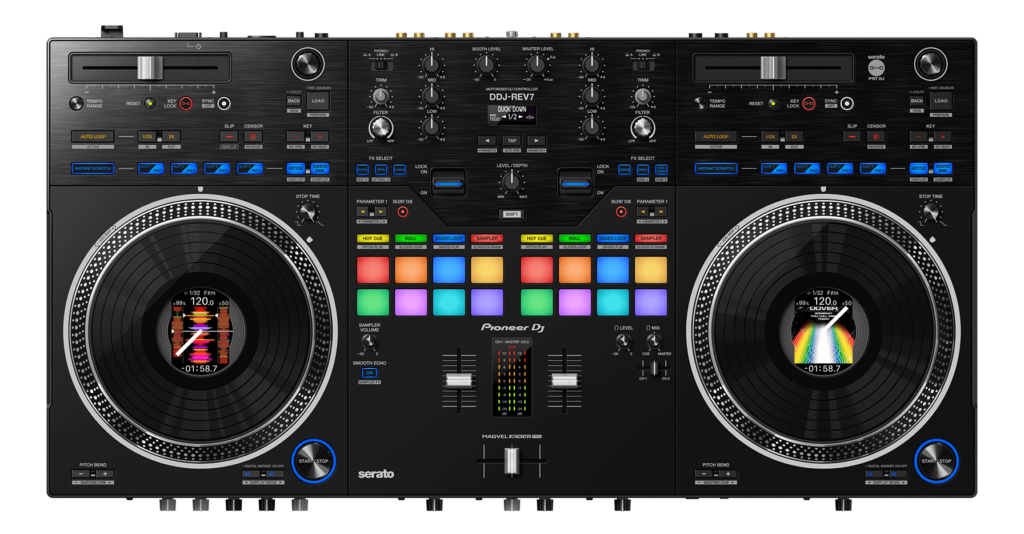
A big factor in moving would be the frustration at your current gear that inevitably builds up as you use it. We all have those niggles when something doesn’t quite work how we want, and we know something else does it better. The jog wheels are a bit stiff. Tempo faders are a bit short. Crossfader doesn’t have a tight enough cut.
A lot of (usually newer) DJs get sucked into the idea of ‘industry standard’ gear. You get into the hobby via your first controller with included software, and everyone tells you that you have to use rekordbox for when you end up on CDJs. Obviously, the paradigms for DJing are basically the same across all the different DJ software, bar some differences in terminology and layout, but at the end of the day a set of decks are a set of decks. It’s only when you get into the nuance of workflow that you start to notice differences that don’t work for you. But you seem to know so many more people on Serato/VDJ, and they find it so much easier to get support from their peers, so you move over to them, because it’s easier than struggling along with what you’ve got.
There’s a constant flux of changes to our requirements. As DJs, we evolve our ability or ambition, moving through various bits of hardware until we settle on what finally meets our needs.
How would you do it?
The moment you commit to changing your DJ setup out of the software/hardware you currently use, you’re effectively packing your digital home and moving to a new neighbourhood. It’s stressful, it’s work you want to avoid.
This is why ecosystems are attractive: you can switch equipment (and even workflow), and the fundamentals are already set up for you. If you’re using Serato DJ with a controller, you’re likely to be able to unplug it, and swap it out for other already-supported gear like a scratch mixer and DVS.
If you’re willing to throw caution to the wind, it can be cathartic to just completely start over again. Just start with your files and a blank track browser. There are huge hurdles, and probably lots of work ahead, but as long as your old software has been writing tags to the files (as well as to its own database), then your metadata should transfer over easily.
With this fresh start, you can keep things organised in a way that works for you. Years ago, I wrote a Traktor-focused guide over on the Native Instruments blog explaining how I set up my library. It’s still how I manage things, despite having 20+ years of music in varying states of bitrate and recording fidelity.
You can, of course, use various apps to wholesale transfer your playlists over, but that’s definitely a YMMV type of situation.
You’re not really trapped
The companies making the software and hardware aren’t really stopping anyone from switching, they just don’t make it easy. And sometimes they can be downright hostile to any efforts to help users make the choice. The creator of Rekord Buddy, Didier Malenfent (AKA Damien Sirkis) discovered this after years of trying to work with the industry, with little support across the board.
The restrictive walled garden approach to library management benefits only the industry. It’s nothing more than a way to tie paying customers to their respective products, and offers no real feature advantage, nor does it encourage the innovation our industry badly needs.
I find this approach to be unacceptable, which is why I made Rekord Buddy.
This has been a labour of love over many years. It was the first to market and enjoyed enough success that I could make it my full time gig.
But recently I’ve been struggling with something, and that’s how my beliefs conflict with my actions. By selling Record Buddy as a product and then as a service, I’m profiting from the poor practices of the DJ industry, albeit in a bid to provide a solution to this bad practice.
That ends today.
As of October 9th 2020 Rekord Buddy is a free app and will become open source software, free for anyone to use and modify as they wish, before the end of the year. Without revenue, I’ll continue to support and develop it more as a labour of love, but user support will minimal and sporadic.
Rekord Buddy did what it set out to do. What happens next is up to you. Join me and let’s make it fulfill its motto and stay the one and only “by DJs, for DJs” app out there.
https://djworx.com/teaser-free-world-exclusive-rekord-buddy-goes-open-source/
Ultimately, it’s hard to build solid tools to help users, but companies mostly seem to rely on laziness and apathy to keep customers from moving. It’s still possible to do so if you really want to, and this is something that MixMasterG continues to work to help the community with.
As an entity, And The Groove Remains Production Team (ATGR), existed as a DJ collective in Hilversum, Netherlands since 1984. When DJ software started to gain traction back in the late 00s, I identified a critical issue: the lack of compatibility between different platforms. To address this, I began developing a tool for myself to convert DJ data between Traktor, djay, and Rekordbox, which eventually evolved into the DJ Conversion Utility (DJCU). Fast forward to 2024, and DJCU is now the industry standard for maintaining cues, loops, crates, and playlists across various DJ software.
Part of the challenge of creating and maintaining these tools is ensuring everything is as consistently portable as it can be, due to the different ways each platform handles audio decoding and cue point storage, but it is possible. The tools I create aim to always be affordable, one-time purchases, avoiding the subscription fees that are common these days. I have been a member of the DJ community for many years, and these tools continue to exist to help anyone that needs them.
An ongoing problem that isn’t likely to find a solution any time soon is the rise in haptics and motorised controls. This adds a whole new layer of compatibility issues, and unless manufacturers start agreeing on standards for their protocols, it’s going to get messy implementing a way to make it work across different ecosystems. That’s not to say it’s impossible… Virtual DJ does a lot of work adding new and old hardware to their already exhaustive list of supported controllers, which includes products like the Kontrol S8 (with screens) and Numark NS7/II/III (motorised platters).
So, the tools are there, but you might have to pay for them, and you’ll need to be prepared to jump through hoops.
As ever… always keep your music collection and databases backed up regularly. No matter how sturdy migration tools might be, there’s always a risk, and even the developers of the tools would always encourage you to make copies before you do anything.
Over to you
Have you put off moving from one platform to another? What held you back? Have you successfully moved to a completely new DJ platform? What tips would you give someone looking to do it?
